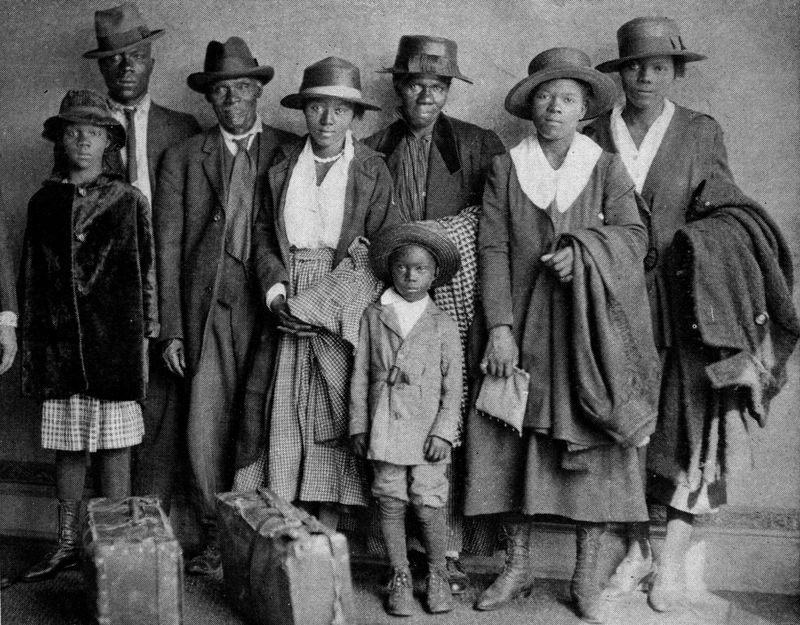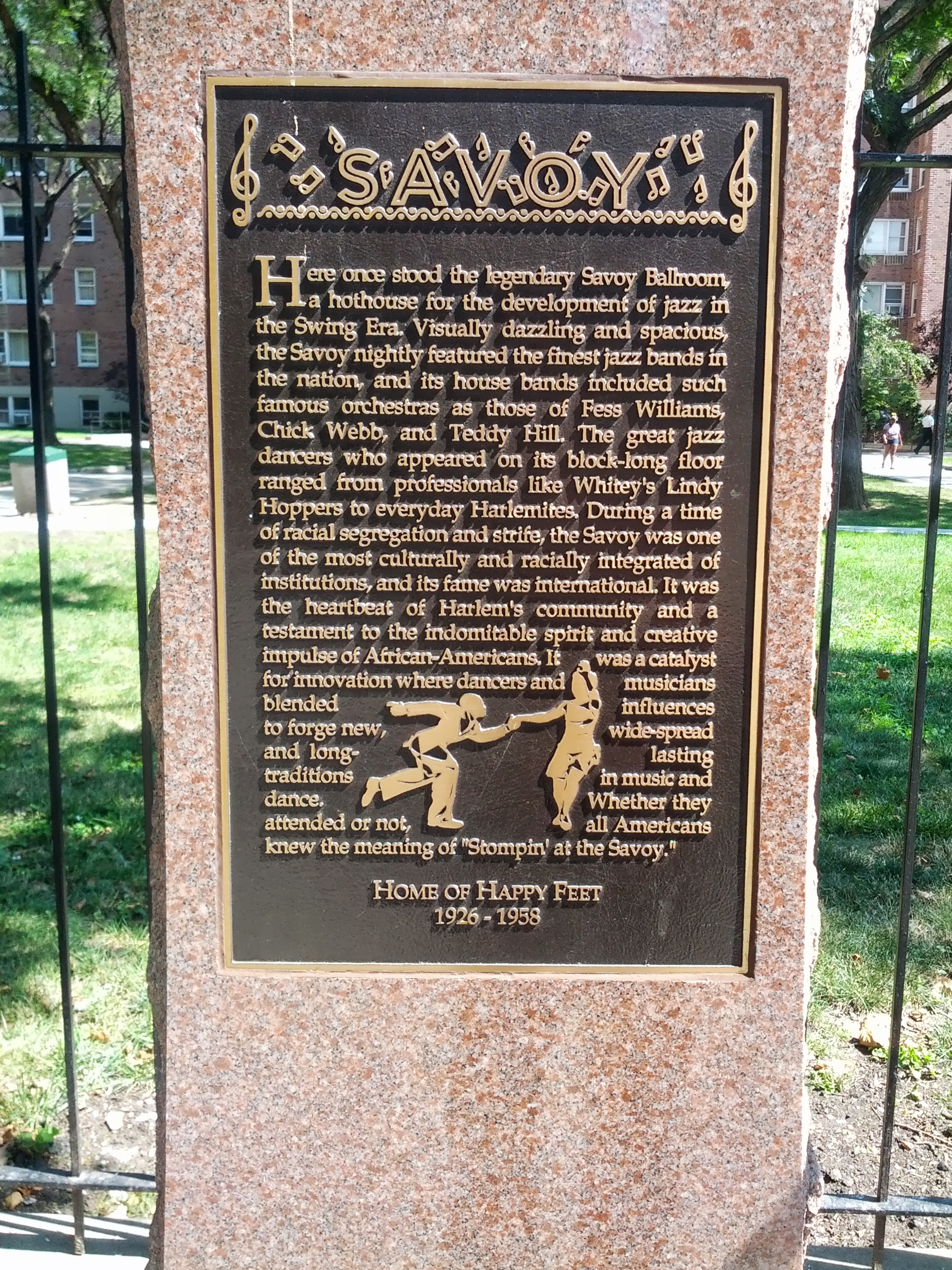|
Rent Party
A rent party (sometimes called a house party) is a social occasion where tenants hire a musician or band to play and pass the hat to raise money to pay their rent, originating in Harlem during the 1920s. These parties were a means for Black tenants to eat, dance, and get away from everyday hardship and discrimination. The rent party played a major role in the development of jazz and blues music, alongside forms of swing dancing. The ''Oxford English Dictionary'' states that the term ''skiffle'' means "rent party", indicating the informality of the occasion. Thus, the word became associated with informal music. However, many notable jazz musicians are associated with rent parties, including pianists Speckled Red, Georgia Tom, Little Brother Montgomery, James P. Johnson, Willie "the Lion" Smith, and Fats Waller, although rent parties also featured bands as well. The ''OED'' also gives ''boogie'' as a term meaning 'rent party'. Rent parties were often the location of so-called ... [...More Info...] [...Related Items...] OR: [Wikipedia] [Google] [Baidu] |
House Party
A house party is a type of party held at the home of the party's host. Organization A house party might be organized several months or just a few hours in advance. News of a party may be spread by personal invitations, word of mouth, posted leaflets, or notices on social networking sites. Mostly people bring a six-pack or a few good bottles, some extra bags and pills, or a couple of boxes of cigarettes to a house party. Uninvited guests Broad notice of a party – sometimes unintentionally – can result in large numbers of people attending who do not know the host personally and may be disruptive. A person who attends a house party without an invitation is typically referred to as a " gatecrasher." Gatecrashing involves entering or participating in an event without authorization, often by blending in with invited guests or exploiting lapses in security. While some gatecrashers may be tolerated or even welcomed by hosts, they are generally viewed negatively due to co ... [...More Info...] [...Related Items...] OR: [Wikipedia] [Google] [Baidu] |
Great Migration (African American)
The Great Migration, sometimes known as the Great Northward Migration or the Black Migration, was the movement of six million African Americans out of the rural Southern United States to the urban Northeast, Midwest, and West between 1910 and 1970. It was substantially caused by poor economic and social conditions due to prevalent racial segregation and discrimination in the Southern states where Jim Crow laws were upheld. In particular, continued lynchings motivated a portion of the migrants, as African Americans searched for social reprieve. The historic change brought by the migration was amplified because the migrants, for the most part, moved to the then-largest cities in the United States (New York City, Chicago, Detroit, Los Angeles, San Francisco, Philadelphia, Cleveland, and Washington, D.C.) at a time when those cities had a central cultural, social, political, and economic influence over the United States; there, African Americans established culturally influent ... [...More Info...] [...Related Items...] OR: [Wikipedia] [Google] [Baidu] |
Beinecke Rare Book & Manuscript Library
The Beinecke Rare Book & Manuscript Library () is the rare book library and literary archive of the Yale University Library in New Haven, Connecticut. It is one of the largest buildings in the world dedicated to rare books and manuscripts and is one of the largest collections of such texts. Established by a gift of the Beinecke family and given its own financial endowment, the library is financially independent from the university and is co-governed by the University Library and Yale Corporation. Situated on Yale University's Hewitt Quadrangle, the building was designed by Gordon Bunshaft of Skidmore, Owings & Merrill and completed in 1963. From 2015 to 2016 the library building was closed for 18 months for major renovations, which included replacing the building's HVAC system and expanding teaching and exhibition capabilities. Architecture The Beinecke Library is an International Style building. Its six-story above-ground glass-enclosed tower of book stacks is encased b ... [...More Info...] [...Related Items...] OR: [Wikipedia] [Google] [Baidu] |
Langston Hughes
James Mercer Langston Hughes (February 1, 1901 – May 22, 1967) was an American poet, social activist, novelist, playwright, and columnist from Joplin, Missouri. An early innovator of jazz poetry, Hughes is best known as a leader of the Harlem Renaissance. Growing up in the Midwest, Hughes became a prolific writer at an early age. He moved to New York City as a young man, where he made his career. He studied at Columbia University in New York City. Although he dropped out, he gained notice from New York publishers, first in '' The Crisis'' magazine and then from book publishers, subsequently becoming known in the Harlem creative community. His first poetry collection, ''The Weary Blues'', was published in 1926. Hughes eventually graduated from Lincoln University. In addition to poetry, Hughes wrote plays and published short story collections, novels, and several nonfiction works. From 1942 to 1962, as the civil rights movement gained traction, Hughes wrote an in-depth week ... [...More Info...] [...Related Items...] OR: [Wikipedia] [Google] [Baidu] |
Willie "The Lion" Smith
Willy or Willie is a masculine, male given name, often a diminutive form of William or Wilhelm, and occasionally a nickname. It may refer to: People Given name or nickname * Willie Allen (basketball) (born 1949), American basketball player and director of the Growing Power urban farming program * Willie Allen (racing driver) (born 1980), American racing driver * Willie Anderson (other) * Willie Apiata (born 1972), New Zealand Army soldier, the only recipient of the Victoria Cross for New Zealand * Willie (footballer) (born 1993), Brazilian footballer Willie Hortencio Barbosa * Willy Böckl (1893–1975), Austrian world champion figure skater * Willy Bocklant (1941–1985), Belgian road racing cyclist * Willy Bogner Sr. (1909–1977), German Nordic skier * Willy Bogner Jr. (born 1942), German fashion designer and alpine skier * Willie Bosket (born 1962), an American convicted murderer whose numerous crimes committed as a minor led to a change in New York state law * Wil ... [...More Info...] [...Related Items...] OR: [Wikipedia] [Google] [Baidu] |
Stride (music)
Stride jazz piano, often shortened to stride, is a jazz piano style that arose from ragtime players. Prominent stride pianists include James P. Johnson, Willie "the Lion" Smith, Fats Waller, Luckey Roberts, and Mary Lou Williams. Technique Stride employed left hand techniques from ragtime, wider use of the piano's range, and quick tempos. Compositions were written but were also intended to be improvised. The term "stride" comes from the idea of the pianist's left hand leaping, or "striding", across the piano. The left hand characteristically plays a four-beat pulse with a single bass note (or an octave, major seventh, minor seventh or major tenth interval) on the first and third beats, and a chord on the second and fourth beats. Occasionally this pattern is reversed by placing the chord on the downbeat and bass notes on the upbeat. Compared to the ragtime style popularized by Scott Joplin, stride players' left hands travel greater distances on the keyboard. Stride p ... [...More Info...] [...Related Items...] OR: [Wikipedia] [Google] [Baidu] |
Savoy Ballroom
The Savoy Ballroom was a large ballroom for music and public dancing located at 596 Lenox Avenue, between 140th and 141st Streets in the Harlem neighborhood of Manhattan, New York City. Lenox Avenue was the main thoroughfare through upper Harlem. Poet Langston Hughes calls it the "Heartbeat of Harlem" in Juke Box Love Song, and he set his work "Lenox Avenue: Midnight" on the legendary street. The Savoy was one of many Harlem hot spots along Lenox, but it was the one to be called the "World's Finest Ballroom". It was in operation from March 12, 1926, to July 10, 1958, and as Barbara Englebrecht writes in her article "Swinging at the Savoy", it was "a building, a geographic place, a ballroom, and the 'soul' of a neighborhood"."Swinging at the Savoy" by Barbara Engelbrecht, ''Dance Research Journal Vol 15 No. 2 Popular Dance in Black America, Spring 1983'' It was opened and owned by white entrepreneur Jay Faggen and Jewish businessman Moe Gale. It was managed by African-American bus ... [...More Info...] [...Related Items...] OR: [Wikipedia] [Google] [Baidu] |
Lindy Hop
The Lindy Hop is an American dance which was born in the African-American communities of Harlem, New York City, in 1928 and has evolved since then. It was very popular during the swing era of the late 1930s and early 1940s. Lindy is a fusion of many dances that preceded it or were popular during its development but is mainly based on jazz dance, jazz, tap dance, tap, breakaway (dance), breakaway, and Charleston (dance), Charleston. It is frequently described as a jazz dance and is a member of the swing (dance), swing dance family. In its development, the Lindy Hop combined elements of both partnered and solo dancing by using the movements and improvisation of African-American dances along with the formal eight-count structure of European partner dances – most clearly illustrated in the Lindy's defining move, the swingout. In this step's open position, each dancer is generally connected hand-to-hand; in its closed position, leads and follows are connected as though in an e ... [...More Info...] [...Related Items...] OR: [Wikipedia] [Google] [Baidu] |
Racketeering
Racketeering is a type of organized crime in which the perpetrators set up a coercion, coercive, fraud, fraudulent, extortionary, or otherwise illegal coordinated scheme or operation (a "racket") to repeatedly or consistently collect a profit. The term "racketeering" was coined by the Employers' Association of Greater Chicago, Employers' Association of Chicago in June 1927 in a statement about the influence of organized crime in the International Brotherhood of Teamsters, Teamsters Union.David Witwer, "'The Most Racketeer-Ridden Union in America': The Problem of Corruption in the Teamsters Union During the 1930s", in ''Corrupt Histories'', Emmanuel Kreike and William Chester Jordan, eds., University of Rochester Press, 2004. Specifically, a racket was defined by this coinage as being a service that calls forth its own demand, and would not have been needed otherwise. Narrowly, it means coercion, coercive or fraud, fraudulent business practices; broadly, it can mean any criminal ... [...More Info...] [...Related Items...] OR: [Wikipedia] [Google] [Baidu] |
Prohibition
Prohibition is the act or practice of forbidding something by law; more particularly the term refers to the banning of the manufacture, storage (whether in barrels or in bottles), transportation, sale, possession, and consumption of alcoholic beverages. The word is also used to refer to a period of time during which such bans are enforced. History Some kind of limitation on the trade in alcohol can be seen in the Code of Hammurabi () specifically banning the selling of beer for money. It could only be bartered for barley: "If a beer seller do not receive barley as the price for beer, but if she receive money or make the beer a measure smaller than the barley measure received, they shall throw her into the water." A Greek city-state of Eleutherna passed a law against drunkenness in the 6th century BCE, although exceptions were made for religious rituals. In the early twentieth century, much of the impetus for the prohibition movement in the Nordic countries and North America ... [...More Info...] [...Related Items...] OR: [Wikipedia] [Google] [Baidu] |
Comfort Food
Comfort food is food that provides a nostalgic or sentimental value to someone and may be characterized by its high caloric nature associated with childhood or home cooking. The nostalgia may be specific to an individual or it may apply to a specific culture. Definition and history The term ''comfort food'' can be traced back at least to 1615, where in the beginning of the second part of Don Quixote, at the beginning of chapter one, Quixote's niece and her nurse (governess, housekeeper?, "ama") are told to pamper him, "to give him things to eat which are comforting and appropriate for the heart and the brain... ." Others trace it back to 1966, when the '' Palm Beach Post'' used it in a story: "Adults, when under severe emotional stress, turn to what could be called 'comfort food'—food associated with the security of childhood, like mother's poached egg or famous chicken soup." According to research by April White at JSTOR, it might have been Liza Minnelli who used the ter ... [...More Info...] [...Related Items...] OR: [Wikipedia] [Google] [Baidu] |
Euphemism
A euphemism ( ) is when an expression that could offend or imply something unpleasant is replaced with one that is agreeable or inoffensive. Some euphemisms are intended to amuse, while others use bland, inoffensive terms for concepts that the user wishes to downplay. Euphemisms may be used to mask profanity or refer to Dysphemism#Taboo terms, topics some consider Word taboo, taboo such as mental or physical disability, sexual intercourse, bodily excretions, pain, violence, illness, or death in a polite way. Etymology ''Euphemism'' comes from the Greek language, Greek word () which refers to the use of 'words of good omen'; it is a compound of (), meaning 'good, well', and (), meaning 'prophetic speech; rumour, talk'. ''Eupheme (deity), Eupheme'' is a reference to the female Greek spirit of words of praise and positivity, etc. The term ''euphemism'' itself was used as a euphemism by the ancient Greeks; with the meaning "to keep a holy silence" (speaking well by not speaking at ... [...More Info...] [...Related Items...] OR: [Wikipedia] [Google] [Baidu] |








